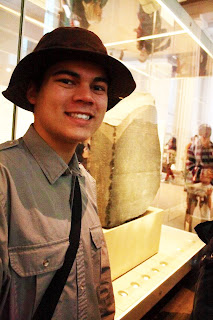Adam
Smith, who as you may or may not already know, was the father of modern
economics. In particular, he invented
the free market/capitalism systems.
This, in summary, was the idea that people could specialize in producing
the things they are good at producing and exchange with others for the things
that they were not good at producing. I
would have much more to say about that at some other time, but that is not
today’s topic. I would like discuss him
as a person, besides just a great theorist.
He was an incredibly humble individual, as shown in this story I once
read in an econ textbook.
Smith
was a professor of theology at the University of Edinburgh and one semester he
was unable to finish the materials he outlined in the syllabus. Feeling rather disappointed in himself, he
offered the class a refund of their tuition.
All of the students turned the offer down stating that they had already
learned so much from him. Smith
immediately began to weep upon hearing his students’ response.
There
is so much in that story that tells of Smith’s character. But instead of rehashing my opinion about it,
I would like you to consider what his various actions tell about his
character. I am, however, very proud to
say that the science of economics was founded by a great man, and not just a
great mind.
Fast
forward 150 years or so and economics has evolved into a full-fledged social
science. Many well-educated experts were
giving more specific ideas about how the world should be run, what role the
government should play in the market and in the lives of the populace,
etc. In fact, people had gotten so smart
with their theories and models that they had started treating economics as if
it were like a physical science. Most
notably was a man named John Maynard Keynes.
His contribution to the study of economics should not be underestimated
and even his fiercest critics saw validity in some of his work. However, he held the opinion that the
government should intervene more in the lives of its citizens, particularly in
times of crisis. He had the belief that if the government, or some governing
body, could know enough about the needs and desires of a population that it
could make decisions about the use of resources to produce things that best
serve that population. It is an interesting idea and has been implemented in
such great nations as the former Soviet Union and North Korea.
Of
those two countries, one failed entirely and the other is tragically
impoverished. The problem is that there
is no way that some people can be smarter and have universal knowledge of
what’s best for people, or know absolutely what everyone in a population
desires. There is just no way that a
ruling coalition can say that they know the preferences of hundreds of millions
of human beings and that they will produce and distribute those things.
This
is the crux of where economics diverges from the natural sciences. In the case of the physical sciences, we can
know the nature of things with certainty, such as the molecular composition of
water, or the equation of force in relation to mass and gravity. In physical sciences, we can be comfortable
applying our knowledge to things in different circumstances because of the
nature of things we have studied doesn’t change. In economics, what we study are human beings:
humans on an individual level, on a social level, on a corporate level, on a
country level, and beyond. It is
important to realize that humans can’t be studied in the same way that physical
things can. People are too dynamic and
complex. To say we can know them like we
know electricity or photosynthesis is not only arrogant, but potentially
dangerous to the people who are affected by our actions.
F.A.
Hayek, Keynes main ideological opponent during their lifetimes, won the Nobel
Prize for economics in 1974 and gave a speech entitled “The Pretense of
Knowledge”. I recently (between now and
the time I started writing this post a few weeks ago) read Socrates’ Apology,
which is where the phrase comes from.
Socrates, in this monologue, talked about his interactions with other
philosophers and found that most of those who were considered “wise” by their
own standards and the standards of society were really rather foolish. This was because those individuals lacked the
capacity to see the limit of their own knowledge, and therefore that there was
infinitely more to be known that was entirely foreign to them. In other words, by thinking that they knew so
much, they were blinded to all that they did not know.
Hayek,
in his speech, warned of the danger of believing that we know too much. Throughout his career, he pointed to the
importance of decentralization of information: that the collective knowledge of
society serves us better than the limited knowledge of a few powerful elite. Imagine that one of the preeminent economists
of his time used the occasion of a Nobel Prize speech, which might usually be a
time for self-promotion, to remind us to stay humble. We as individuals know very little and are
best served to remember that through times of forging personal beliefs as well as
policy decisions that affect millions.
F.A. Hayek



